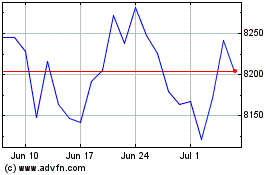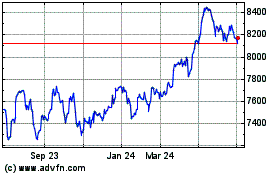By Tom Fairless and Laurence Norman
European governments have pledged hundreds of billions of euros
to help economies, companies and workers hit by the coronavirus,
applying tools developed during the euro crisis and casting aside
strict prohibitions on state subsidies.
The stimulus moves, which come on top of increased government
spending automatically triggered during a downturn, could help
fiscally sound countries including Germany and the Netherlands to
weather the growing economic crisis. But it may not alleviate
hardship for weaker countries such as Italy whose high debt levels
make a major fiscal boost harder to finance.
That divergence could aggravate an economic gap at the heart of
Europe's currency union if it widens the gulf between the region's
strong and weak economies, which in the long term could further
cloud the single currency's future.
Only a small amount of the total amount pledged so far is
stimulus spending that will go directly to business or workers, and
most are commitments that may never be drawn on. The amounts are
designed both as direct help and to boost confidence among banks,
employers and investors that companies won't be left on the hook
for the increasingly dire impact of the virus.
European Union finance ministers said Monday that already
announced fiscal stimulus plans amounted to 1% of the bloc's output
in 2020 and that liquidity support through government guarantees
and deferred tax payments was at least 10% of the EU's GDP.
"These figures could be much larger going forward," the
ministers said.
At the onset of the financial crisis in late 2008, the EU pumped
EUR200 billion ($220 billion) into the economy, around 1.5% of
GDP.
France and the Netherlands on Tuesday became the latest
countries to open the spigot. France promised EUR45 billion in
immediate aid for businesses and employees hit by the coronavirus
pandemic, which is slowing or shutting down swaths of the global
economy.
French Finance Minister Bruno Le Maire said provisional
predictions show the response to the coronavirus will slash 1% from
France's gross domestic product this year.
"This economic war will be long-lasting and violent," Mr. Le
Maire said on French radio.
The Dutch government announced a raft of measures to support
companies, ranging from tax exemptions to having up to 90% of wages
paid by the government. The measures are expected to cost between
EUR10 to EUR20 billion over the next three months, but that sum
could increase, said Finance Minister Wopke Hoekstra. "There is no
cap, we will do whatever necessary to keep jobs and help companies
overcome this," he said during a news conference.
The move followed the crisis response measures of Germany,
Europe's biggest economy and so far the country that has pledged
the greatest action. Government officials said last week they would
provide potentially unlimited government financing for disrupted
businesses, including measures that helped Germany emerge from the
financial crisis a decade ago largely unscathed.
Central to Berlin's plan is a EUR550 billion loan and
loan-guarantee program for businesses of all sizes, though the
government stressed that it has no limit on financial support.
Berlin will replace the wages of employees forced to work
part-time, following a program developed during the financial
crisis that will now be available more quickly and flexibly, and
extended to temporary and agency workers. Berlin will also defer
taxes and lower tax prepayments to ease pressure on businesses.
France is using similar tools. Mr. Le Maire also reiterated
Tuesday in a radio interview that France would guarantee EUR300
billion in bank loans for small and medium-size businesses. "We
won't have one small or medium-size business that doesn't have
[the] liquidity that it needs," he said.
But Italy and Spain, two nations currently hit hardest by the
virus, have been more cautious. Italy's government announced a
EUR25 billion spending plan on Monday that included additional
funds for health care, and provisions to suspend tax payments and
provide mortgage relief to affected businesses and households.
Spain on Tuesday announced up to EUR200 billion in support,
including private funds the government hopes to mobilize. Only
EUR17 billion of the total would be direct support.
Mario Centeno, president of the Eurogroup of eurozone finance
ministers, said Monday that the eventual use of the eurozone's
bailout fund wasn't ruled out although splits within the region
have emerged on the issue. That has EUR410 billion in lending
capacity left and could be directed, as in the past, at the
eurozone's frailest economies.
"We are not taking any possible solutions off the table," he
said. "We will defend the euro and our citizens with everything
we've got."
In Brussels, the European Commission has also announced plans to
pump tens of billions of euros into the economy, including by
scrapping payments governments were due to make to the EU and by
quickly implementing tens of billions of euros worth of unused
funds to fight the impact of the virus. It is also guaranteeing
loans to small firms and revving up action by its lending arm, the
European Investment Bank, to do likewise. But the bloc's tools are
limited because it remains largely decentralized.
Even without new fiscal measures, Europe's state-funded welfare
systems provide broad automatic shock absorbers during a downturn
or public health crisis, via generous unemployment insurance, sick
pay and universal health care schemes.
In Britain, which recently left the EU, the Bank of England and
the U.K. Treasury on Wednesday unexpectedly announced a joint
package of initiatives to support British businesses and
households, with the government announcing a GBP30 billion ($39
billion) stimulus. The UK on Tuesday also said it would offer
GBP330 billion of loan guarantees to support businesses through the
crisis.
The EU finance ministers on Monday agreed to loosen EU fiscal
and state aid rules so governments can boost stimulus efforts and
ensure companies have enough cash on hand to get through the coming
weeks and months.
For now, finance ministers have agreed to exempt public
spending, including stimulus measures, related to dealing with
coronavirus from the bloc's strict government-spending limits. They
could go further and suspend all efforts to slim deficits in the
medium term if they believe the bloc is hitting a broad and severe
economic downturn.
--Paul Hannon contributed to this article.
Write to Tom Fairless at tom.fairless@wsj.com and Laurence
Norman at laurence.norman@wsj.com
(END) Dow Jones Newswires
March 17, 2020 15:08 ET (19:08 GMT)
Copyright (c) 2020 Dow Jones & Company, Inc.
FTSE 100
Index Chart
From Mar 2024 to Apr 2024

FTSE 100
Index Chart
From Apr 2023 to Apr 2024
